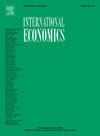Does English proficiency promote international trade?
引用次数: 0
Abstract
This study examines the impact of English proficiency on international trade using panel ARDL models with data from 105 countries spanning the period from 2011 to 2023. The findings reveal that English proficiency facilitates long-term growth in trade volumes by reducing transaction costs and enhancing global market access. However, its effects on trade balances are mixed, with regions such as Europe and Latin America experiencing negative associations, while Asia and the Middle East benefit from export-driven gains. In contrast, minimal long-term impact is observed in Africa due to linguistic diversity and structural challenges. The study highlights regional and contextual differences, emphasizing the importance of tailored policies to maximize trade benefits.
The extended results, which also include native English-speaking countries, reinforce the core findings and provide stronger evidence that English proficiency has a significant and positive effect on trade volume.
精通英语能促进国际贸易吗?
本研究使用面板ARDL模型考察了英语水平对国际贸易的影响,数据来自105个国家,时间跨越2011年至2023年。研究结果表明,英语水平通过降低交易成本和提高全球市场准入,促进了贸易额的长期增长。然而,它对贸易平衡的影响是喜忧参半的,欧洲和拉丁美洲等地区经历了负面关联,而亚洲和中东则受益于出口驱动的增长。相比之下,由于语言多样性和结构挑战,在非洲观察到的长期影响很小。该研究强调了地区和背景差异,强调了制定有针对性的政策以实现贸易利益最大化的重要性。扩展结果(也包括以英语为母语的国家)强化了核心发现,并提供了更有力的证据,证明英语水平对贸易额有显著的积极影响。
本文章由计算机程序翻译,如有差异,请以英文原文为准。
求助全文
约1分钟内获得全文
求助全文
来源期刊

International Economics
Economics, Econometrics and Finance-Economics, Econometrics and Finance (all)
CiteScore
6.30
自引率
0.00%
发文量
74
审稿时长
71 days
 求助内容:
求助内容: 应助结果提醒方式:
应助结果提醒方式:


